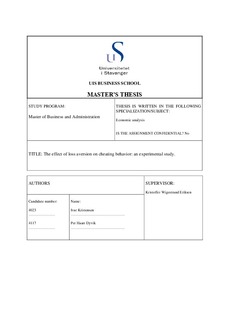| dc.contributor.advisor | Eriksen, Kristoffer Wigestrand | |
| dc.contributor.author | Kristensen, Ivar | |
| dc.contributor.author | Dyvik, Per Haarr | |
| dc.date.accessioned | 2019-09-12T11:33:03Z | |
| dc.date.available | 2019-09-12T11:33:03Z | |
| dc.date.issued | 2019-06-14 | |
| dc.identifier.uri | http://hdl.handle.net/11250/2616582 | |
| dc.description | Master's thesis in Economics | nb_NO |
| dc.description.abstract | In this thesis our main objective is to investigate how loss aversion affects cheating and dishonest behavior. We conduct a lab-experiment built on the experimental design of Mazar, Amir, and Ariely (2008) where we manipulate the framing by paying the treatment group exante to create a higher reference point. Regarding loss aversion and its effect on cheating behavior, limited research has been done. Grolleau, Kocher, and Sutan (2016) also conducted an experiment built on Mazar et al (2008) and found evidence that loss aversion has a substantial impact on cheating. We contribute by designing the experiment in a way that enables us to examine cheating on an individual level, allowing us to investigate how other factors such as social pressure and demography affect cheating.
The experiment was conducted at campus, consisting of one control and one treatment group. There was a total of 59 participants. First, the participants got 2,5 minutes to solve simple but time-consuming search tasks. After the time limit, the subjects threw away their answers, and reported the number of correctly solved exercises on a small report slip. The last part of the experiment consisted of answering a questionnaire, before the formalities of the payment were finalized. The subjects didn’t know that all the papers were marked with invisible ink. This allowed us to identify how many matrices each participant solved correctly, and how many they reported to have solved.
Our results indicate that loss aversion increases the willingness to cheat, in line with prospect theory and the notion that losses loom larger than gains (Kahneman & Tversky, 1979). However, our results indicate significantly smaller effects than that of Grolleau et al. (2016). We also see that the overall willingness to cheat is negatively correlated with performance of the participants. In addition, our results suggest that participants who believe they performed worse than the average, are more willing to act dishonest. The main findings of our experiment have applications for policy enforcement where resources are limited, enforcers may want to focus on monitoring individuals that risk losing something. Also, managers in companies should be aware that gain-loss framing could have an impact on cheating and dishonest behavior and that poor performers often are more likely to act dishonest in order to avoid losing face. | nb_NO |
| dc.language.iso | eng | nb_NO |
| dc.publisher | University of Stavanger, Norway | nb_NO |
| dc.relation.ispartofseries | Masteroppgave/UIS-HH/2019; | |
| dc.rights | Navngivelse 4.0 Internasjonal | * |
| dc.rights.uri | http://creativecommons.org/licenses/by/4.0/deed.no | * |
| dc.subject | økonomi | nb_NO |
| dc.subject | administrasjon | nb_NO |
| dc.subject | økonomisk | nb_NO |
| dc.subject | analyse | nb_NO |
| dc.subject | cheating | nb_NO |
| dc.subject | loss aversion | nb_NO |
| dc.subject | dishonesty | nb_NO |
| dc.subject | behavioral finance | nb_NO |
| dc.title | The effect of loss aversion on cheating behavior: an experimental study. | nb_NO |
| dc.type | Master thesis | nb_NO |
| dc.subject.nsi | VDP::Social science: 200::Economics: 210::Business: 213 | nb_NO |

